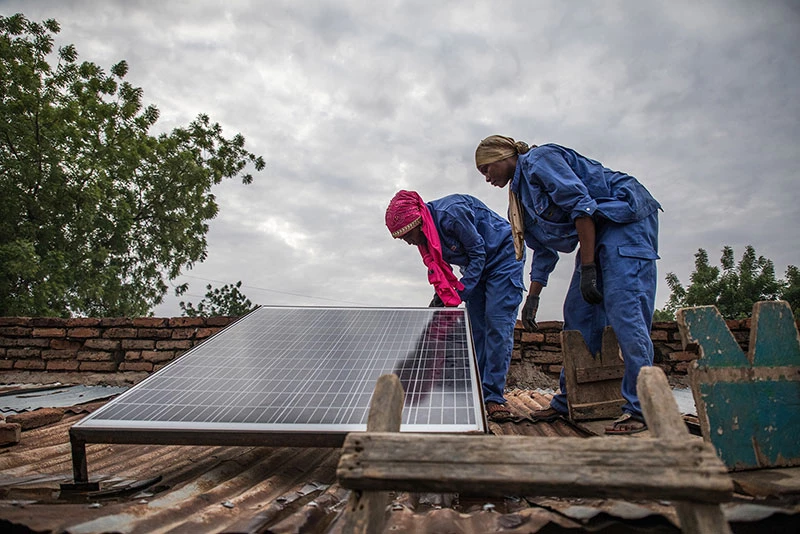The renewable energy sector is growing exponentially across sub-Saharan Africa as efforts are ramped up to transition to green energy. According to the International Energy Agency, clean energy could account for more than 60 percent of new power generation in Sub-Saharan Africa by 2040, excluding South Africa.
Despite the growth of the clean energy solutions sector, women, who are disproportionately affected by climate change, are underrepresented. Although women account for 31.6% of STEM graduates in Sub-Saharan Africa, statistics show that they make up only 13% of the workforce in the energy sector..
To ensure a just transition, the United Nations Sustainable Development Goal 5 focuses on achieving gender equality and empowering all women and girls. Moreover, the AU Strategy for Gender Equality and Women’s Empowerment (GEWE) framework aims to strengthen women’s agency in Africa by ensuring their voices are amplified and their concerns addressed through effective implementation of legislation and proper financing of gender equality work.
Progress & Persistent Challenges
Jennifer Boca, Head of Environmental, Social and Governance at Africa-focused renewable power generation company Lekela, says, “Promoting the participation of women in the renewable energy sector is vital as the sector plays a bigger role in helping to provide access to energy for all.”
Despite a global shift in gender equality and a call to action on women’s empowerment, some challenges persist. According to the Global Energy Alliance for People and Planet report, deep-rooted social norms and biases persistently influence workplaces and communities, subtly shaping hiring practices and career trajectories.
Another barrier to women’s participation in the energy sector is the lack of professional networking and mentoring. In 2024, International Financial Corporation launched the Women in Renewable Energy in Africa Network (W-REA), the first professional network for women working in sub-Saharan Africa’s renewable energy sector, to address this gap.
The gender gap is also driven by unequal access to education, limited access for women to technical skills and training opportunities, as well as unfair company policies.
The launch of WEN-Africa is a call to action for a future where women lead and engage on innovative solutions in Africa’s energy sector.
According to Anne Kabugi, IFC’s Regional Gender Lead for Africa, “Enhancing women’s participation in the renewable energy sector is not only about employing more women, it is also about promoting women’s entrepreneurship through corporate supply chains and community engagement and investment strategy.” She adds that IFC will work with companies to reduce these gender gaps.
So far, WEN-Africa has secured partnership commitments from eight energy sector institutes in Africa, signed by ministers, chief executive officers, and managing directors, most of whom are male.
Some of the committed activities signed by the partners to be achieved by the end of 2025 are:
- An internship program for females in Science, Technology, Engineering and Mathematics (STEM) fields.
- A mentorship program targeting female leaders and technical staff in the energy sector.
- Support for the establishment of a workplace childcare facility and lactation rooms.
- Revision and adoption of institutional gender inclusive policies including human resource policy and gender equality.
The clean energy sector has the potential to open many employment opportunities for women to join the sector as green entrepreneurs. Besides, Africa has the highest proportion of female entrepreneurs in the world, with 25.9% of women in Sub-Saharan Africa in the process of starting or already managing a business.
Companies need to come together to learn, network, and exchange best practices while implementing gender-smart solutions in their businesses to support female leadership in the sector.
Collaborative action plans and strong partnerships are laying the groundwork for concrete changes that will empower women and foster a more inclusive and sustainable energy sector. And as the race to save the planet heats up, the global community needs all available hands on deck.
Read Also: Clean Cooking Possible with Bridging the Energy Gap Globally



